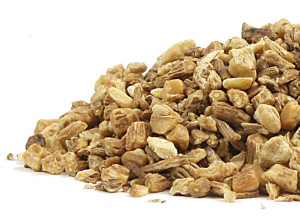Dong quai is a plant. People use the root to make medicine.
Contents
Uses
Dong quai is used for menstrual cramps, premenstrual syndrome (PMS), and menopausal symptoms. It is also used orally as a ”blood purifier”; to manage hypertension, infertility, joint pain, ulcers, “tired blood” (anemia), and constipation; and in the prevention and treatment of allergic attacks. Dong quai is also used orally for the treatment of loss of skin color (depigmentation) and psoriasis.
Some men apply dong quai to the skin of the penis as part of a multi-ingredient preparation for treating premature ejaculation.
In Southeast Asia, other Angelica species are sometimes substituted for dong quai (Angelica sinensis). Most often these include Angelica acutiloba, which is predominantly found in Japan; and Angelica gigas, which is mainly found in Korea. Although these three species are similar, the chemicals they contain are different. Don’t think of these species as interchangeable.
Benefits
- Balances estrogen levels. Dong quai is the premier “gynecological regulator.” It has the ability to reduce your estrogen levels if they are too high and can increase them if they are too low.
- Excellent blood tonic. Master herbalist, Ron Teeguarden, attributes the blood toning and nourishing effects of dong quai to its amazing vitamin and mineral content. Dong quai contains vitamin B 12, folic acid, folinic acid, nicotinic acid, and biotin.Dong quai is helpful after any injury or surgery to replenish your red blood cells and increase blood volume. It’s included in nearly all Chinese herbal blood-building formulas.
- Treats iron deficiency and anemia. The cobalt in dong quai is thought to increase the hemoglobin content of your blood. (Hemoglobin is the protein in your blood that contains iron and carries oxygen to cells and carbon dioxide from them.)
- Boosts male fertility. Ferulic acid, an antioxidant found in dong quai, has been shown to improve sperm quality.
- Essential during and after menstruation. Dong quai is an antispasmodic that eases cramps and other symptoms of PMS. It dilates your blood vessels to increase flow during your monthly cleansing and helps replenish blood after your period has ended.Women who stop taking birth control pills may also find dong quai useful to encourage a regular cycle.
- Helps you feel happier! Dong quai is effective at reducing anxiety and could be useful to help you combat stress and reduce the severity of mood swings. It has a calming effect on your nervous system and promotes relaxation.
- Enhances female fertility. Only a generation ago, infertility was rare, but now it takes the average woman up to18 months to conceive. Women often seek the help of expensive fertility specialists and undergo painful procedures when an antifungal diet and an herb like dong quai may be all that are needed.
- Keeps you beautiful and youthful. Chinese women are known for their age-defying youthfulness, and dong quai may be a big part of it. Dong Quai preserves your natural beauty by encouraging health from the inside out.Ron Teeguarden notes that Dong Quai increases circulation, improves your complexion, and aids detoxification to clear blemishes.
- Treats alopecia, eczema and rosacea. Dong Quai’s effect on the blood and circulation also prompts healing for common skin conditions like eczema and rosacea, neurodermatitis, pruritis, hives and vitiligo.
Caution
Special Precautions & Warnings:
Pregnancy and breast-feeding: Taking dong quai by mouth during pregnancy is POSSIBLY UNSAFE for the baby. Dong quai seems to affect the muscles of the uterus. There is also one report linking an herbal combination that contained dong quai with birth defects in a baby whose mother took the combination during the first three months of pregnancy. Don’t use dong quai if you are pregnant.
There isn’t enough information about the safety of using dong quai during breast-feeding. Stay on the safe side and don’t use it.
Bleeding disorders. Dong quai might slow blood clotting. In theory, dong quai might increase the risk of bruising and bleeding in people with bleeding disorders.
Hormone-sensitive conditions such as breast cancer, uterine cancer, ovarian cancer, endometriosis, or uterine fibroids: Dong quai might act like estrogen. If you have any condition that might be made worse by exposure to estrogen, don’t use dong quai.
Protein S deficiency: People with protein S deficiency have an increased risk of forming blood clots. There is some concern that dong quai might increase the risk of clot formation in these people because it has some of the effects of estrogen. Don’t use dong quai if you have protein S deficiency.
Surgery: Dong quai can slow blood clotting. It might increase the risk of bleeding during and after surgery. Stop taking dong quai at least 2 weeks before a scheduled surgery.
Interactions
- Medications that slow blood clotting (Anticoagulant / Antiplatelet drugs) interacts with DONG QUAI
Dong quai might slow blood clotting. Taking dong quai along with medications that also slow clotting might increase the chances of bruising and bleeding.Some medications that slow blood clotting include aspirin, clopidogrel (Plavix), diclofenac (Voltaren, Cataflam, others), ibuprofen (Advil, Motrin, others), naproxen (Anaprox, Naprosyn, others), dalteparin (Fragmin), enoxaparin (Lovenox), heparin, warfarin (Coumadin), and others.
- Warfarin (Coumadin) interacts with DONG QUAI
Warfarin (Coumadin) is used to slow blood clotting. Dong quai can also slow blood clotting. Taking dong quai along with warfarin (Coumadin) can increase the chances of bruising and bleeding. Be sure to have your blood checked regularly. The dose of your warfarin (Coumadin) might need to be changed.
Other names
Angelica China, Angelica sinensis, Angelica polymorpha var. sinensis, Angelicae Gigantis Radix, Angélique Chinoise, Angélique de Chine, Chinese Angelica, Dang Gui, Danggui, Danguia, Don Quai, Kinesisk Kvan, Ligustilides, Radix Angelicae Gigantis, Radix Angelicae Sinensis, Tang Kuei, Tan Kue Bai Zhi, Tanggwi, Toki.
Reference
Source: WebMD, http://www.webmd.com/vitamins-supplements/ingredientmono-936-dong%20quai.aspx?activeingredientid=936&activeingredientname=dong%20quai
Bodyecology, http://bodyecology.com/articles/nine_benefits_of_dong_quai.php

